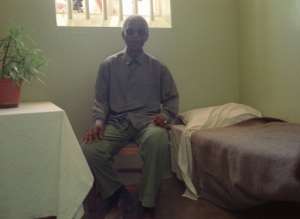
CAPE TOWN (AFP) - Gaming fans will soon be able to navigate Nelson Mandela's South African apartheid prison on Robben Island in a new computer game, developers announced Thursday.
The game, designed to be an educational tool, will be modelled on life on the island where South Africa's anti-apartheid campaigners were jailed and will be released next year as part of a multi-media project dubbed "Mandela 27."
The title is a reference to the number of years the anti-apartheid icon spent in jail before his release in 1990.
Players will see scenes of typical prison life, such as labourers breaking rocks, said developer Werner Ravyse, of North West University's Serious Games Institute in South Africa.
Discussions are still ongoing as to whether Mandela, whose image use requires permission, may be a character in the game.
It is one of several projects in "Mandela 27" which will link events that took place in Europe and South Africa during his incarceration.
"The project is really all about the cultural events that happened during the 27 years that Nelson Mandela was locked up," said Jacqueline Cawston of Coventry University's Serious Games Institute in Britain.
Next month, an interactive website will be launched showing events in Europe and South Africa during those years will also put the spotlight on music, art, and theatre.
David Powell, of the Swedish firm Elderberry, said the website will document social and cultural events during a time of political crackdown in South Africa and when Europe was also going undergoing democratic change.
Life-size prison cells modelled on Mandela's cell will also be built for exhibitions in Europe and South Africa with multi-media displays from 2014.
The project is partly funded by the European Union with a total budget of 400,000 euros ($518,000).




 Cecilia Dapaah: Reasons behind AG’s advice to EOCO not grounded in law – Martin ...
Cecilia Dapaah: Reasons behind AG’s advice to EOCO not grounded in law – Martin ...
 NPP should have reported Kingsley Nyarko’s conduct to police – Inusah Fuseini
NPP should have reported Kingsley Nyarko’s conduct to police – Inusah Fuseini
 Akufo-Addo cuts sod for MIIF Technical Training Centre
Akufo-Addo cuts sod for MIIF Technical Training Centre
 NPP didn’t struggle to win Ejisu by-election – Samuel Ayeh-Paye
NPP didn’t struggle to win Ejisu by-election – Samuel Ayeh-Paye
 A/R: Achiase Chief arrested for acid attack on community members
A/R: Achiase Chief arrested for acid attack on community members
 Naa Ayemoede returns to school
Naa Ayemoede returns to school
 Dadieso residents block Accra-Kumasi highway
Dadieso residents block Accra-Kumasi highway
 Kasoa soldier killer remanded
Kasoa soldier killer remanded
 Rashid Pelpuo slams Opoku Prempeh for denying dumsor
Rashid Pelpuo slams Opoku Prempeh for denying dumsor
